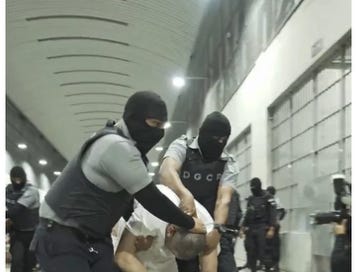'Out of our hands': The most dangerous lie in Trump’s deportation doctrine
The stalling—thinly disguised as deliberation—only reinforces the truth. The refusal is political.
By Brian O’Neill
Kilmar Abrego García is not a gang member. He is not a terrorist. He is a 29-year-old sheet metal apprentice from Maryland, a lawful U.S. resident married to an American citizen, and the father of a 5-year-old son with autism. In mid-March, he was pulled over by Immigration and Customs Enforcement officers while driving home from his mother’s house. He was detained, and deported to El Salvador—despite a federal court order that explicitly barred his removal.
Today, Abrego García sits in a Salvadoran maximum-security prison, detained with suspected gang members and other migrants the U.S. government has expelled under sweeping executive orders. His confinement was not authorized by any criminal conviction. It was not the result of an asylum denial or final order of removal. It was, as a federal judge put it, a “wholly lawless” act.
On April 4, Judge Paula Xinis, a federal district court judge in Maryland ordered his return to the United States and condemned the government’s actions in unusually blunt terms. She noted that the government’s own filings admitted the deportation was an “administrative error” and that no lawful grounds existed for his detention.
Nonetheless, the Trump administration refused to act. Instead, its legal representatives have told the Supreme Court that the situation is out of their hands. Abrego García, they argue, is now in the custody of a foreign power—and, therefore, beyond the reach of U.S. courts.
That claim is not only wrong, it is also dangerous.
Let us begin with the fiction of helplessness. When U.S. officials say they can’t secure Abrego García’s release, they are being disingenuous. The U.S. ambassador in San Salvador represents the president of the United States and is treated accordingly. In countries such as El Salvador, that role carries enormous informal power; Salvadoran officials, especially those reliant on U.S. financial and political support, do not ignore requests from the U.S. ambassador lightly.
But if diplomacy fails—or is too slow—another channel is available: the CIA Chief of Station, or COS. This officer is the senior U.S. intelligence official in country. Their job is to know the power players in security, intelligence, and law enforcement. Unlike an ambassador, a COS does not need to go through diplomatic channels. The San Salvador COS could pick up the phone and call the national leaders, and the Abrego García issue would be resolved.
In the unlikely event the COS was somehow ineffective or sidelined, Washington could escalate. The CIA director could contact his counterpart in El Salvador–and that’s a call that would not be ignored.
The result? Abrego García could be identified and separated from the prison population the same day. In the past, U.S. agencies have orchestrated far more complex transfers, evacuations from war zones, and covert prisoner swaps.
To suggest that this case—involving a cooperative government receiving $6 million from the United States to detain deportees—is beyond American influence is simply false. It is a refusal, not an impossibility.
So why won’t the Trump administration correct this egregious mistake—and almost thousands of other miscarriages of justice?
The answer has three layers. First is the autocrat’s test. Strongmen often probe the boundaries of judicial authority, daring courts to enforce rulings and daring the public to object. It’s a tactic observed in Venezuela, Hungary, Turkey, and Russia: defy a judge, provoke a standoff, and see whether institutions flinch. The Trump administration’s refusal to comply with a clear court order is not about law. It is about precedent—specifically, breaking it.
Second is the warning. By refusing to retrieve Abrego García, the administration is sending a message: This can happen to anyone. If you are deemed a threat or simply an inconvenience, you can be disappeared. You can be removed before a hearing, held without charge, and disavowed by your own government. If courts cannot intervene abroad, there is no limit to this practice.
That is not an exaggeration. It is explicitly the legal position the administration put before the Supreme Court last week. The government argued that its blunder didn’t authorize Xinis to “seize control over foreign relations, treat the Executive Branch as a subordinate diplomat, and demand that the United States let a member of a foreign terrorist organization into America.”
One court observer described the Trump administration’s position in starker terms: “We lost the plaintiff fair and square, so the courts can’t give him any relief now.”
Third is the man himself. President Donald Trump cannot admit error. Whether out of pride or pathology or both, he has repeatedly shown an inability to say, “I was wrong.” This is not a quirk. It is a core trait of a sociopath: the incapacity for remorse, the reflex to deflect rather than take responsibility. And when that trait is paired with the levers of state power, the consequences are not rhetorical. They are human, and they are brutal.
This public debate is not intimidating or embarrassing to the Trump administration, win or lose. It tells those wishing to flee tyrannical regimes that the United States is no better. And for those already here—including lawful residents, especially those of Latin descent—the message is clear: Don’t challenge us; we don’t care.
As legal scholars Erwin Chemerinsky and Laurence H. Tribe wrote in a guest essay for The New York Times, “The answer can only be that [the administration] is using this case to establish a truly chilling proposition: that no one can stop the Trump administration from imprisoning anyone it wants anywhere else in the world.”
The Abrego García case is not about immigration policy. It is about the rule of law. About whether the U.S. government can break its own procedures, detain people without cause, and escape judicial review by outsourcing its dirty work to a foreign jail.
That question is no longer hypothetical. On Thursday, the Supreme Court instructed the Trump administration to “facilitate and effectuate” Abrego García’s return, but stopped short of ordering it outright. In response, the administration has done little to suggest urgency. On Friday the administration said it needed more time to determine his condition and location, yet, less than 24 hours later, the State Department confirmed that Abrego García is being held in El Salvador’s Terrorism Confinement Center and is “alive and secure.”
The stalling—thinly disguised as deliberation—only reinforces the truth: the tools exist. The authority exists. The refusal is political.
Every day Abrego García remains imprisoned prolongs the damage—legally, morally, and institutionally—and leaves open the possibility that executive refusal can outlast judicial pressure.
Perhaps we should give CIA Director John Ratcliffe and Director of National Intelligence Tulsi Gabbard the benefit of the doubt. Maybe they didn’t realize during the Houthi attack that the secure conference rooms, the SCIFs, the in-car systems, and the airborne comms were built for exactly that kind of moment. Maybe they don’t know what a station chief is or the leverage that office holds in nearly every capital, even in places less than hospitable to us.
But that would be a stretch.
No, the answer is more disturbing. The national security leaders of the Trump administration know they can send carrier groups to the Middle East and carry out air strikes in Yemen with a simple phone call. They also know that a similar phone call can move mountains elsewhere. They just don’t want to, certainly not for Abrego García.
Brian O’Neill, a retired senior executive from the CIA and National Counterterrorism Center, is an instructor on strategic intelligence at Georgia Tech.






As mentioned, Nayib Bukele said Monday that he did not plan to return to Kilmar Abrego García to the United States. And, of course, the God Emperor Divine Right King Donald the First, says, Okay, whatever, good to go, I really don't give a fuck anyway. Little Marco say, fine with me, he shouldn't have been here anyway. Across the so-called "Trump Administration," the party line is now, Fuck Due Process, we have a winner! Nayib Bukele and El Salvador just opened the gates for any and everyone we want to "deport!"
For over 40+ years, I swore an oath to defend the Constitution of the United States, and now I finally am facing really-for-real domestic enemies. From the NC "Supreme Court." overturning an election, to the Thought Police using "antisemitism" and any others things it wishes as grounds for deporting people -- citizenship apparently not being relevant. The bullying and threats toward legal firms, colleges & universities, and government officials is a clear sign that it is time to take Howard Beale's "I Am Mad As Hell And I Am Not Going To Take It Anymore," literally.
I cannot believe that I have lived to see this happening. A South African Nazi being given free rein to destroy government agencies on his whim, using a gang of teenage thugs. The so-called Republican "conservatives" in Congress standing by while the very concept of "conservatism" is destroyed and replaced by some bizarre combination of personal whim and reactionary nonsense.
We ended up with the Declaration of Independence and fighting a war against what we considered tyranny for far less than what is now happening to the country.
It is time to think about what was once utterly unthinkable...
This is bigger than tariffs. This is the very essense of being an American...